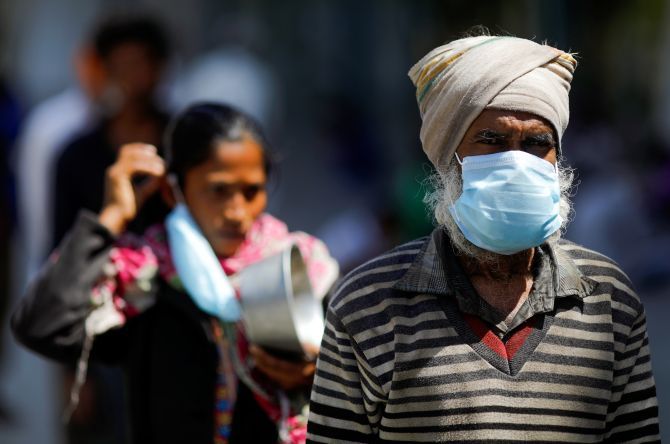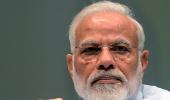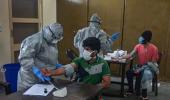The rate of doubling of COVID-19 cases in India is at present 4.1 days but if the cases linked to the Tablighi Jamaat congregation would not have happened, it would have been 7.4 days, the health ministry said on Sunday.

"If the Tablighi Jamaat incident had not taken place and we compare the rate of doubling - that is in how many days the cases have doubled, we will see that currently it is about 4.1 days (including Jamaat cases) and if the incident had not taken place and additional cases had not come then the
doubling rate would have been around 7.4 days," Joint Secretary Lav Agarwal said.
Agarwal said 472 new COVID-19 cases and 11 deaths have been reported since Saturday. The total coronavirus cases stand at 3,374 and the death toll is now 79. He said 267 people have recovered.
However, a tally of figures reported by states directly showed at least 106 deaths, while the number of confirmed cases had reached 3,624. Of the total, 284 have been cured and discharged.
There has been a lag in the Union health ministry figures, compared to the numbers announced by different states, which officials attribute to procedural delays in assigning the cases to individual states.
On the shortage of personal protective equipment, Agarwal told reporters at the briefing that the government has started the procurement of PPEs from other countries too.
"Parallelly around the world wherever the PPE is available we have started procurement from them too. The good news is that a number of philanthropic organisations are making efforts to enhance our supplies. We have dispatched materials also. Even today, in a video conference, we asked states to rationally use PPE so that no shortage arises," he said.
Clarifying whether coronavirus is airborne or not, an Indian Council of Medical Research official said at the briefing, "We need to understand that in science whoever does experiments some will have a 'for opinion and some against' but we need to take a balanced, evidence-based approach."
"For example, if it was an air-borne infection then in a family whoever has a contact they all should come positive because they are living in same surrounding as the patient and the family is breathing the same air. When someone is admitted in hospital, other patient would have got exposure (if it was air borne) but that is not the case," said Raman R Gangakhedkar, head of epidemiology and communicable diseases at ICMR.
On the question of rapid antibody test, Gangakhedkar said test kits should be available by Wednesday.
Agarwal said Cabinet Secretary Rajiv Gauba held a meeting with district magistrates, superintendent of police, chief medical officers, state and district surveillance officers, state health secretaries and district health secretaries and chief secretaries on Sunday on COVID-19.
District officials shared the strategies adopted by them to combat the pandemic like how they delineated containment and buffer zone, how they carried out door-to-door survey through special teams, how through telemedicine and call centres people who had come from outside were
monitored.
The districts from where many cases were reported like Agra, Bhilwada, Gautam Buddh Nagar, Pathan Mitha, East Delhi also shared their experiences and strategies.
The main points that came out were proactive and ruthless containment implementation at field level and preparedness to the extent of being over prepared to handle cases at any stage, Agarwal said.
All DMs were instructed that pharma units making devices and medicines must run seamlessly, he said.
The district officials also shared how they monitored the elderly population of their areas through ring-fencing. They also shared their experience on how hospitals and hotels are being used as isolation facilities, Agarwal added.
COVID cases have been reported in 274 districts and the cabinet secretary requested all DMs to maintain uniformity in their response and establish a crisis management plan, he said.
"Yesterday, the prime minister held a meeting of the empowered committees and they briefed him about the actions taken by them at their level in relation to quarantine and isolation facilities, testing and critical training," Agarwal said.
He said the Health Ministry has asked all chief secretaries and health secretaries to ensure all health professionals are made aware of the new insurance scheme implemented by the government.
"The Health Ministry has also discussed about providing adequate supply of oxygen cylinders," he said.
Agarwal said Health Minister Harsh Vardhan on Sunday visited AIIMS-Jhajjar. On Saturday, he visited LNJP hospital and before that he visited Safdarjung and RML hospitals in Delhi.
AIIMS-Jhajjar will function as a dedicated COVID-19 hospital with 300 beds in isolation wards.
"Under the National Rural Livelihood Mission, 65,000 people from 14,522 self-help groups in 399 districts of 24 states have started the process of manufacturing masks," Agarwal said.
Moreover, in view of the lockdown to ensure that the supplies are not disturbed, the Indian Railways has done transportation through 2.5 lakh coal wagons and 17,700 petroleum products wagons, he said.











 © 2025
© 2025